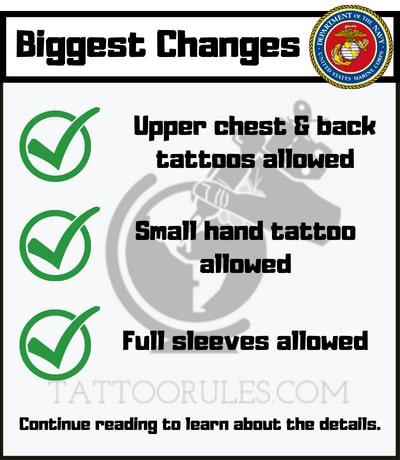There’s no more patriotic thing to do than serve your country on the front lines, and that’s exactly what the men and women of the United States military do.
If you’re an inked person and are considering enlisting in the US Marines Corps (USMC), you might be wondering what the Marine Corps tattoo policy is.
The same applies to those of you who already serve in the Corps and plan on getting new body art done in the near future.
The USMC tattoo policy has been chopping and changing over the last few years so it’s little wonder many people are confused about what is and isn’t allowed.
And we’re here to clear your doubts.
In this article, we are diving right into the new Marine Corps tattoo policy for 2023.

Marine Corps Tattoo Policy – All You Need to Know
Before we proceed to the details and the history of changes related to Marine Corps tattoo regulations, let’s get you accustomed to the basics of the current tattoo restrictions for Marines.
Tattoos Allowed in the Marines
As you can see in the image below, even though tattoos on some body areas are prohibited, there are some exceptions to the rule.

As far as the placement of tattoos is concerned, the only outright banned areas are the head and neck. Even if you try to cover these in any desperate ways (eg. with a band-aid), it’s a no-go.
In the past, Marine Tattoo regulations also completely banned tattoos on the back, chest, hands, and sleeves. However, according to the latest Per Marine Corps Bulletin 1020 updated in October 2021, this is no longer the case. Hence:
- US Marine is allowed to have back and chest tattoos as long as they are adequately covered with a crew-neck t-shirt
- US Marine is allowed to have a sleeve tattoo as long as it doesn’t extend past the circumference of the wrist bone
- US Marine is allowed to have one finger tattoo on each hand in the “band” form, as long as it’s not bigger than 3/8 of an inch in width
Marine Tattoo Policy & the Moral Compass
What’s worth noting, even if the placement of your tattoo is within the fair game according to the policy, it doesn’t mean that your commanding officer will allow it. Tattoos that are strictly prohibited – regardless of the area – are those that go against moral values and the ethos of the Corps.
These include, but are not limited to, anything racist, sexist, or homophobic. If you have any doubt about whether or not your tattoo will be allowed, it’s always best to err on the side of caution and consult with a superior before getting inked.
This is what the MCBUL 1020 states on the matter:
“Tattoos that are prejudicial to good order and discipline, or that are of a nature to bring discredit upon the naval service, are prohibited. Examples include, but are not limited to, tattoos that are drug-related, gang-related, extremist, obscene or indecent, sexist, or racist.”
For more insights, you can read the current Pet Marine Corps Bulletin 1020 by clicking here.
USMC Tattoo Policy History
When it comes to all divisions of the United States Military, The Marine tattoo guidelines seem to have been the subject of the most frequent changes.
The old Marine Corps tattoo policy was much more problematic and restrictive. For example, the much-discussed sleeve tattoos were originally banned in 2007. USMC came to this conclusion after the 2006 Sergeants Major Symposium which ruled that the Marines had “excessive” tattoos.

It took nearly a decade for the MCo tattoo policy to be relaxed – but just a bit. The 2016 update upheld the sleeve tattoo ban but allowed for an unlimited number of tattoos on other body parts (except the head, neck, and hands).
What’s more, tattoos visible in the training uniforms disqualified serving Marines from special duty assignments which give the soldiers the best chance of promotions and better pay.
The 2016 rules were more strict for officers and officer candidates, however, who were limited to a total number of 4 tattoos visible in the PT uniform. This has changed only in the 2021 policy update which brings all the Marines under the same regulations.
“Marine Corps Embassy Security Group will continue to screen current and contemplated tattoos for all applicants and Marines currently serving as Marine Security Guards. This screening process will determine if a Marine’s tattoos are suitable for worldwide deployment, to include regions that may have cultural sensitivities to different types of tattoos. MCESG will continue to restrict service for those with tattoos that host nation or interagency partners may find offensive or inconsistent with our diplomatic mission,” – Capt. Ryan Bruce, a Marine Corps spokesman, told Marine Corps Times on Dec. 16.
Tattoos and the Marines: FAQ
We hope that by now you’re well-educated on the latest US Marines tattoo policy. To summarize some of the points discussed in the article as well as answer some additional questions on the subject, below find the FAQ section.
Can you be a Marine if you have tattoos?
Yes, absolutely, USMC doesn’t discriminate against inked people but under some conditions.
The new Marine Corps tattoo policy is more lenient than the previous one, but there are still some restrictions. For example, service members are not allowed to have tattoos on their faces, neck, or hands. Additionally, any tattoos that are considered obscene or racist are not permitted.
What tattoos will disqualify you from the Marines?
Any tattoos that are considered obscene or racist are not permitted under the policy. Additionally, service members are not allowed to have tattoos on their faces, neck, or hands.
Can you join the Marines if you have a tattoo on your wrist?
It depends on the size and the exact location of the tattoo. The current US Marine Corps tattoo policy allows for tattoos close to the wrist but not on the actual wrist. In other words, they can’t extend past the wrist bone.
Can you join the Marines with sleeve tattoos?
The current tattoo policy allows for sleeve tattoos as long as they meet certain criteria. The tattoos must not be obscene or racist, and they can’t extend past the wrist bone.
What is the Marine Corps band tattoo policy?
The band “rule” applies to finger tattoos. Under the current tattoo policy for the Marines, you’re allowed to have a finger tattoo resembling a band (one on each hand).
What is the current Marine Corps’ arm tattoo policy?
You’re allowed to have as many tattoos on your arm as you want.
What is the current Marin Corps’ forearm tattoo policy?
Again, you can have unlimited tattoos in this area. However, they can’t extend past the line of your wristbone.
Is the Marine Officer tattoo policy different?
It was before but it isn’t now. After the 2021 tattoo policy changes, the Marine Corps officer tattoo regulations are exactly the same and all Marines are held to the same standards.
Can I get a tattoo after boot camp?
Yes, as long as it meets the criteria laid out by the Marine Corps tattoo policy.
Will the military pay for tattoo removal?
The military does not currently pay for tattoo removal, but there are a few options available to those who wish to have their tattoos removed.
Final Word & References
As you’ve learned in the article, tattoo rules for Marines have been changing in recent years, but there are still some guidelines that all Marines must follow. When getting a tattoo, be sure to do your research and choose a design that will not get you into trouble down the road.
With the constantly-evolving world and the growing acceptance of tattoos, we can expect the tattoo requirements for Marines to keep easing in the future. For now, stick to the rules, be respectful of the Corps’ history and tradition, and enjoy your ink!
All the information included in the article is based on official sources, including but not limited to Pet Marine Corps Bulletin 1020.
Articles related to this one include: CIA tattoo regulations, FBI tattoo regulations, and French Foreign Legion tattoo policy.


